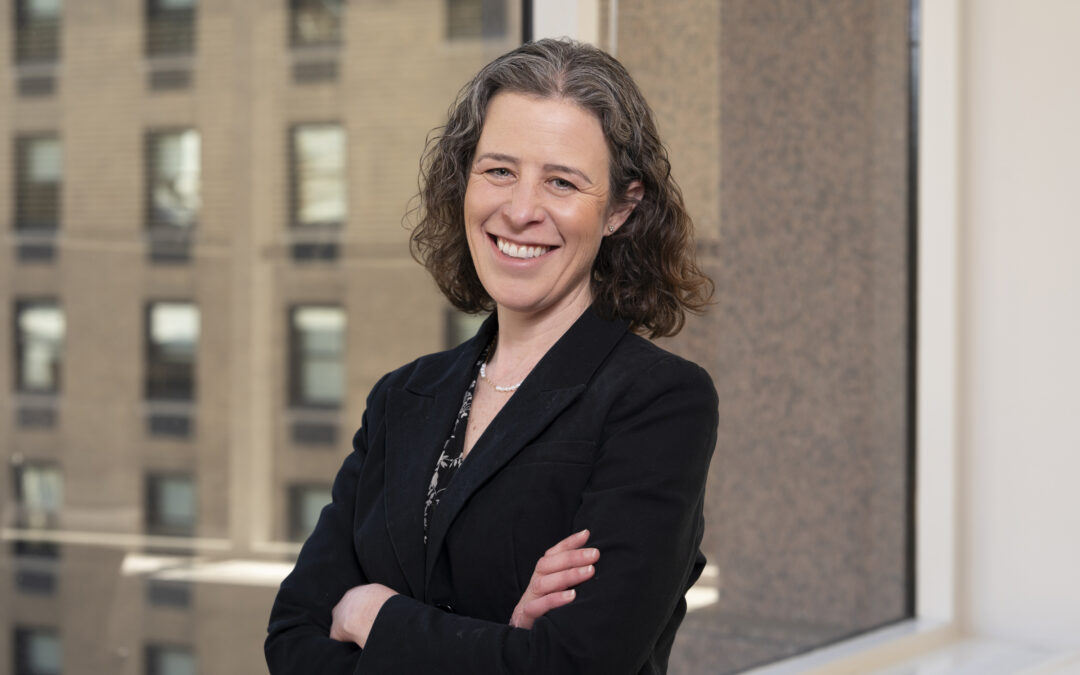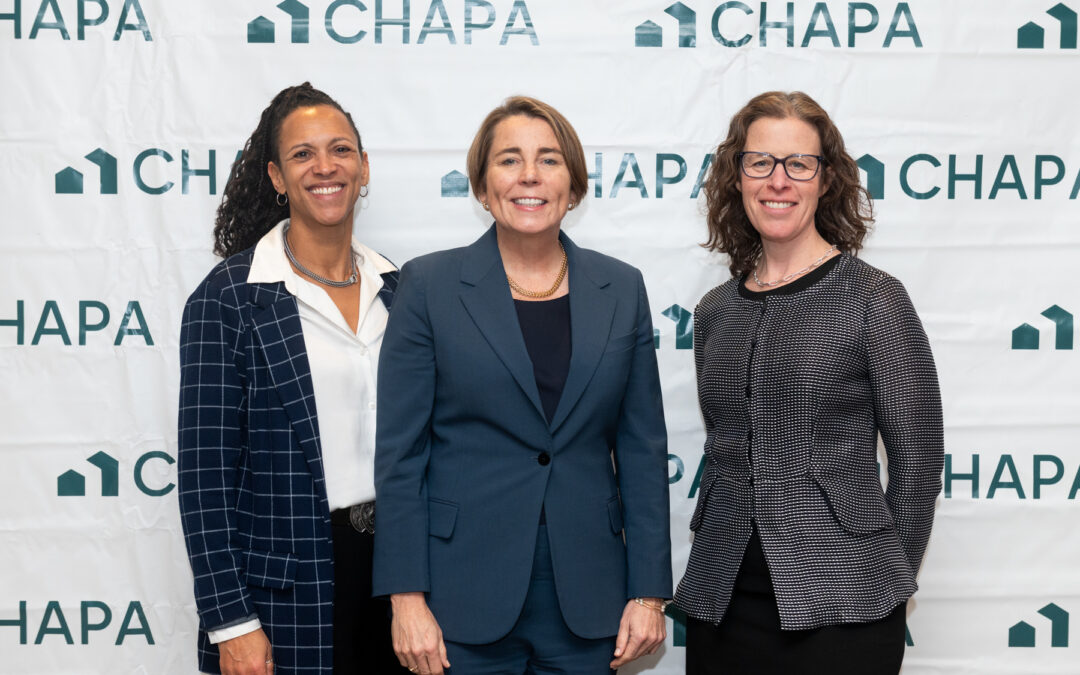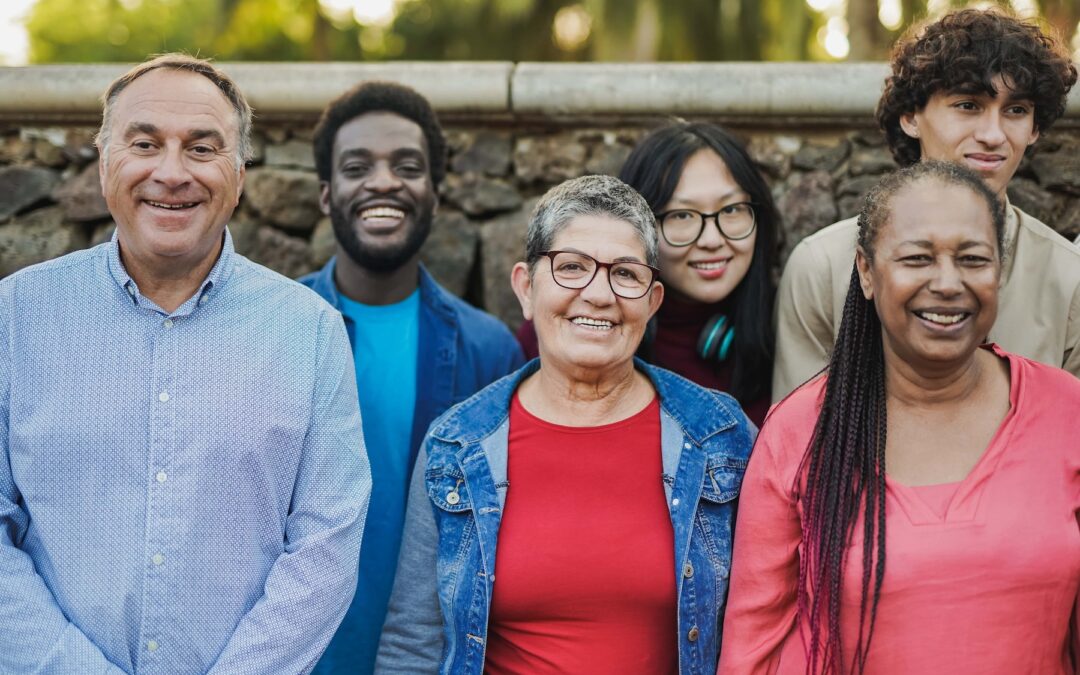by Jenna Connolly | Jan 8, 2026 | Housing News
This week, Secretary of State Bill Galvin announced that all four proposed ballot measures seeking to weaken or repeal the MBTA Communities Act did not receive enough signatures to advance, providing more evidence of Massachusetts voters’ strong support for creating more homes near transit. Citizens’ Housing and Planning Association (CHAPA) celebrates this milestone as a victory that will ensure the continued efficacy of this landmark housing law and as another strong indication that Massachusetts voters are committed to taking action to solve the Commonwealth’s housing shortage.
“Massachusetts must build 220,000 new homes by 2035 to meet demand and stabilize housing prices, and the MBTA Communities Act is an essential part of achieving that goal,” said Rachel Heller, CHAPA’s chief executive officer. “The MBTA Communities Act will create more opportunities for people to buy their first homes, for seniors to downsize, and for teachers, firefighters, and small business owners to live in the communities they serve. We all benefit when people have choice in where they call home.”
An overwhelming majority of 93%—165 out of 177—MBTA Communities have adopted districts to comply with the law, creating opportunities for new homes near transit. According to the Executive Office of Housing and Livable Communities, over 6,000 new homes are already in the development pipeline as a result of this law.
Despite unsuccessful ballot campaigns and legal challenges, the MBTA Communities Act has consistently enjoyed widespread popularity among Massachusetts voters. In a 2024 poll conducted by WBUR and Commonwealth Beacon, 50% of respondents said the law is good policy, while only 31% said it is not. Furthermore, a recent poll from MassINC and Abundant Housing Massachusetts found that 79% of voters support building more homes near transit statewide.
“The residents of MBTA Communities whom we’ve worked alongside have consistently told us that housing is their number one issue,” said Lily Linke, CHAPA’s director of municipal engagement. “The MBTA Communities Act allows municipalities to plan for the growth they need to meet demand where it makes sense for their unique circumstances.”
Signed into law by then-Governor Charlie Baker in 2021, the MBTA Communities Act requires all municipalities served by the MBTA to designate an area where property owners can legally build apartments, townhomes, and other types of mid-scale multifamily housing.

by Jenna Connolly | Jan 8, 2026 | Featured News, Housing News
We write to share important news about a leadership transition at Citizens’ Housing and Planning Association (CHAPA). After 13 years of dedicated service to CHAPA, including nine years as our Chief Executive Officer, Rachel Heller will be stepping down from her role to become the next Executive Director of Massachusetts Housing Partnership (MHP).
During Rachel’s tenure, CHAPA has grown stronger as a leading voice and convener for the affordable housing and community development field. Under her leadership, CHAPA expanded its advocacy to advance equitable housing opportunities, built new partnerships with diverse stakeholders statewide, and strengthened the organization’s commitment to ensuring affordable housing and choice in every community. While we will deeply miss Rachel’s vision, energy, and steadfast leadership, we are thrilled that she will continue to shape the future of affordable housing in Massachusetts through her new role at MHP.
“On behalf of CHAPA and key Massachusetts housing stakeholders, we are deeply grateful for Rachel’s impactful leadership over the last thirteen years. She both stewarded and expanded CHAPA’s important legacy of advocacy for safe, affordable, and welcoming homes statewide so everyone has a place to call home in the communities they choose,” said Leslie Reid, CHAPA President and Chief of Investment Programs at Massachusetts Housing Investment Corporation. “We are thrilled that she will continue to advance important initiatives toward greater affordable housing access and opportunity for all residents as Executive Director at Massachusetts Housing Partnership.”
CHAPA’s Board of Directors will soon begin a search process for our next CEO. Please stay tuned for the job posting next week. Rachel will continue as CHAPA CEO’s until the last week of February, when our Chief Operating Officer, Maritza Crossen, will step in as Interim CEO. In the meantime, please join us in congratulating Rachel on this exciting new chapter and in celebrating her many contributions to CHAPA and the affordable housing field.
We have so many exciting ongoing initiatives at CHAPA, and we will continue to move full steam ahead towards our strategic goals. Please join us at the upcoming federal forum and the Housing Policy Action Center’s research webinar. Continue to advocate with us for state legislation and budget priorities that further affordable housing opportunity, equity, and access. Our brand new Massachusetts Housing Leadership Academy has kicked off with its first cohort of community leaders dedicated to creating thriving communities, and we can’t wait to share more updates with you as this program progresses.

by Jenna Connolly | Nov 21, 2025 | Featured News, Housing News
Over 400 housing leaders from across the Commonwealth, including Governor Maura Healey, Lieutenant Governor Kim Driscoll, and Executive Office of Housing and Livable Communities Secretary Ed Augustus, convened yesterday to shape how the Commonwealth can boost our housing production and meet the state’s goal of 222,000 homes by 2035. Hosted by Citizens’ Housing and Planning Association (CHAPA), the Housing Summit featured experts in modular housing, infrastructure, and climate innovation who presented creative solutions to meet the Commonwealth’s housing shortage.
“It was inspiring to join so many thoughtful and committed leaders at the CHAPA Summit who have been strong partners in our efforts to make housing more affordable across Massachusetts,” said Governor Maura Healey. “With CHAPA’s support, we’ve made significant progress — passing the Affordable Homes Act, legalizing ADUs by right, creating an Office of Fair Housing and setting the first ever statewide housing production goal. Thanks to this work, we have nearly 100,000 housing starts already underway and we’re going to continue our partnership to build more housing and lower costs for the people of Massachusetts.”
The Summit opened with a panel led by Secretary Augustus and his colleagues from across sectors: Commissioner Adam Baacke, DCAMM Undersecretary for Environment Stephanie Cooper, Undersecretary of Labor Josh Cutler, and Chief Melissa Hoffer. The panel explored how the Commonwealth can work together as a state to meet Massachusetts’ housing goals. Senator Julian Cyr and Representative Andy Vargas gave opening remarks after the panel.
“The Healey-Driscoll Administration knows that we need to accelerate housing production right now to bring down costs and provide relief to renters and homeowners navigating the tight housing market,” said Ed Augustus, Secretary of Housing and Livable Communities. “As we look to what’s next for housing in Massachusetts, we are grateful to CHAPA and today’s summit for convening the best minds in housing policy to brainstorm new solutions and deliver impact.”
Other topics explored during the event included exploring how strategic land reuse, such as the Yes in God’s Backyard (YIGBY) legislation, can dramatically increase housing capacity across the Commonwealth, using innovative construction methods, such as Mass timber, to build sustainable housing faster, and finally how developers will obtain the capital and train the workforce to build the housing needed in communities across the state. Visit the Housing Summit website for the full event agenda with panel topics and speakers.
Building on the lessons learned from the Summit, CHAPA will lead efforts to turn insights into action, creating tangible outcomes that help thousands of Massachusetts residents gain and maintain stable housing.
Summit attendees also heard from experts from Nectar Community Investments, Reframe Systems, Way Finders, Metropolitan Area Planning Council (MAPC), Massachusetts Housing Partnership (MHP), Devens Enterprise Commission, BLD Properties, Northern Middlesex Council of Governments (NMCOG), Community Economic Development Assistance Corporation (CEDAC), Boston Communities, Mass Cultural Council, The Lynch Foundation, the Office of Real Estate Management Division of Capital Asset Management & Maintenance (DCAMM), Father Bill’s & MainSpring, ISC Massachusetts, Boston Housing Authority, Beacon Communities, Allston Brighton Community Development Corporation, Massachusetts Community Climate Bank, Causeway Development, National Housing Crisis Task Force, CREA, State Street, MassHousing, Massachusetts Housing Investment Corporation (MHIC), ICON Architecture, City of Boston, Massachusetts Clean Energy Center, Preservation of Affordable Housing (POAH), Stantec, National Development, Massachusetts Department of Environmental Protection (MassDEP), Harvard University, Graduate School of Design, Capstone Communities, WoodWorks – Wood Products Council, Monte French Design Studio, Code Red Consultants, Leggat McCall Properties LLC, NEI General Contracting, MassINC Policy Center, Just A Start, and Massachusetts American Federation of Labor and Congress of Industrial Organizations (AFL-CIO).

by Jenna Connolly | Nov 6, 2025 | Featured News, Housing News
Citizens’ Housing and Planning Association (CHAPA) opened applications for its new Massachusetts Housing Leadership Academy, a six-month fellowship designed to empower local officials with the knowledge, skills, and network to create more homes for people of all ages, incomes, and abilities in their communities. With a housing shortage of 222,000 new homes needed by 2035 and local decision-making determining much of the Commonwealth’s development, strengthening the voices of pro-housing municipal leaders will benefit Massachusetts’ communities, people, and economy.
“When we work towards creating more housing in every city and town, teachers, nurses, and firefighters can afford to live near their workplace. People can downsize in the communities they love. College graduates can come home,” said Rachel Heller, CHAPA’s chief executive officer. “The Massachusetts Housing Leadership Academy will prepare local leaders to meet the housing needs of all members of their communities so everyone can thrive.”
CHAPA’s Academy is free and open to: Mayors, City and Town Councilors, Planning and Select Board Members, Finance Committee members, and any members of boards and commissions who can impact housing. The Academy’s curriculum will cover the history and causes of the Commonwealth’s housing shortage, municipal solutions, and strategies for taking those solutions from idea to implementation. Fellows will benefit from monthly virtual workshops with housing experts, monthly cohort meetings, and more.
The Massachusetts Housing Leadership Academy builds upon CHAPA’s proven community engagement model. CHAPA’s Municipal Engagement Initiative, a program supporting local pro-housing coalition-building, has worked in 45 communities since 2018 with groups like Engine 6 in Newton and the Greater Newburyport Housing Choice Coalition. In 2023, CHAPA expanded its reach to offer free technical assistance and community engagement to planners seeking compliance with the MBTA Communities Act. 97% of the 85 communities CHAPA supported have now achieved compliance.
“Proactive, inclusive, and informed community engagement can move the needle on creating more housing opportunities,” said Lily Linke, CHAPA’s director of municipal engagement. “From the Cape to the Berkshires, there are countless elected and appointed local officials who are dedicated to solving their communities’ housing challenges, and the Massachusetts Housing Leadership Academy can provide them with the tools they need to succeed.”
The first fellowship of the Massachusetts Housing Leadership Academy will run from January to June 2026. Those interested in the Academy can apply or nominate an official in their community at bit.ly/MAHousingLeadershipAcademy until December 15, 2025.
by Jenna Connolly | Aug 5, 2025 | Housing News
On July 24th, President Trump issued an Executive Order (“EO”) on homelessness that trades effective solutions for fear-based politics. Casting the unhoused as “public safety threats,” the EO sidelines proven Housing First strategies in favor of punitive measures, like homeless sweeps and prosecution, that displace rather than house. This kind of crackdown will only serve to create more barriers to housing, not fewer.
The Massachusetts Supportive Housing Pipeline Coalition (the “Coalition”) believes that everyone in Massachusetts deserves access to a safe and affordable home in the community of their choice. That is especially true for our neighbors experiencing homelessness who have the most to gain from stable, long-term housing. Overwhelming evidence shows that supportive housing is the most effective way to help this population. Supportive housing combines the Housing First strategy—which prioritizes fast, affordable, and permanent housing placement for those experiencing homelessness—with ongoing, person-centered services to increase well-being and improve housing stability.
Rising housing costs across the country continue to make affordable housing out of reach for millions and have contributed to record-high homelessness. To combat these issues, elected officials should be championing evidence-based solutions like supportive housing. Instead, the EO does the opposite and undermines state-level Housing First programs by directing the Executive Branch to “end[] support for ‘housing first’ policies.”
This directive could have disastrous consequences in Massachusetts. Not only is the Commonwealth already grappling with an affordable housing shortage, but recent social safety net cuts and changes to Medicaid and SNAP will soon inflict serious financial harm on the poorest Bay Staters. Under these conditions, any reduction in federal funding for supportive housing will hinder our best homelessness interventions, exacerbating and prolonging housing instability for countless Massachusetts individuals and families.
Contrary to the EO’s messaging, the unhoused are both less likely than housed people to commit violent crime, and more likely to be the victims of violence than to perpetrate it. And while many within the unhoused population struggle with drug use and mental health, research reveals that a third live with a serious mental illness and that 20-35% suffer from substance abuse issues. Far from overwhelming numbers.
False narratives about homeless people incite fear and dehumanization. And yet the EO relies on those narratives to justify its support for harsh and punitive tactics. Among its other directives, the EO instructs federal agencies to:
- Prioritize federal funding for jurisdictions that “enforce prohibitions” on things like “urban camping and loitering;” and
- Maximize involuntary civil commitment as a response to homelessness.
Encampment sweeps and other policies that criminalize survival activities may temporarily remove homeless people from sight, but they negatively impact health outcomes and can exacerbate homelessness in the long term. Involuntary commitments suffer from similar drawbacks. Jurisdictions that have studied forced hospitalization have found that it often fails the first time. And mental health professionals have explained that the practice is liable to cause serious trauma and do more harm than good, while providing no guarantee of housing, treatment, or recovery support services after discharge.
Even more fundamentally, these interventions do nothing to mitigate the primary structural driver of homelessness: a widespread lack of affordable housing.
The Coalition, which represents over 80 diverse organizations working in housing production, healthcare, and homelessness, has built a strong network of Commonwealth leaders and stakeholders committed to advancing the housing solutions we know work. Together, our impactful advocacy has already helped create new tools like the Supportive Housing Pool Fund, as well as three state commissions focused on affordable housing. The Coalition is committed to fostering a Massachusetts where homelessness is rare, brief, and one-time. And it will push back against any policy that impedes that goal, including the EO.
To make progress on homelessness, we must reject fear-based narratives and focus on strategies grounded in data and human dignity. That means restoring federal support for the Housing First approach and ending punitive policies that inflict damage without lasting results. There is still time to reverse the course charted in this EO, and the Coalition implores federal officials to do so immediately. Now is the time to focus on the future we want to see for Massachusetts—one where everyone has the support they need to thrive.
Citizens’ Housing and Planning Association (CHAPA)
Massachusetts Association for Mental Health (MAMH)
Massachusetts Housing and Shelter Alliance (MHSA)
United Way of Massachusetts Bay
Western Massachusetts Network to End Homelessness
###
The Massachusetts Supportive Housing Pipeline Coalition is a diverse coalition of more than 80 nonprofit and for-profit developers, healthcare companies, service providers, policy organizations, and advocates working to scale supportive housing options and ensure those with the most to gain from a home have what they need to heal and thrive. To learn more, please visit masupportivehousingcoalition.org.



